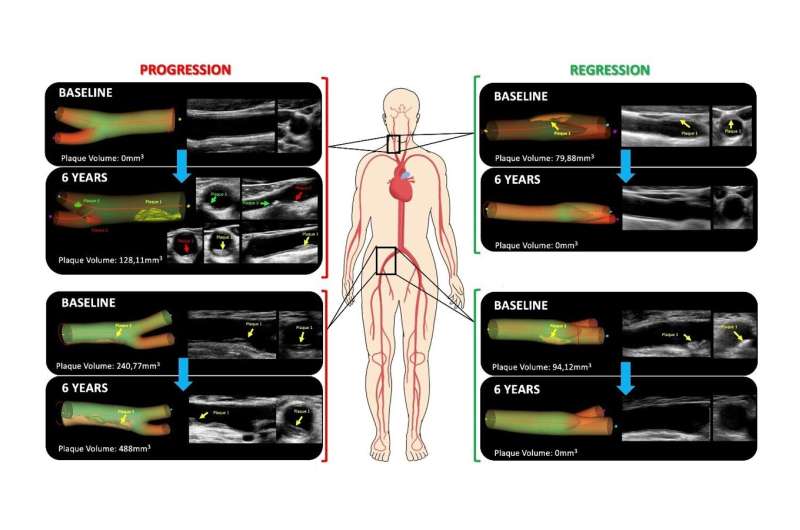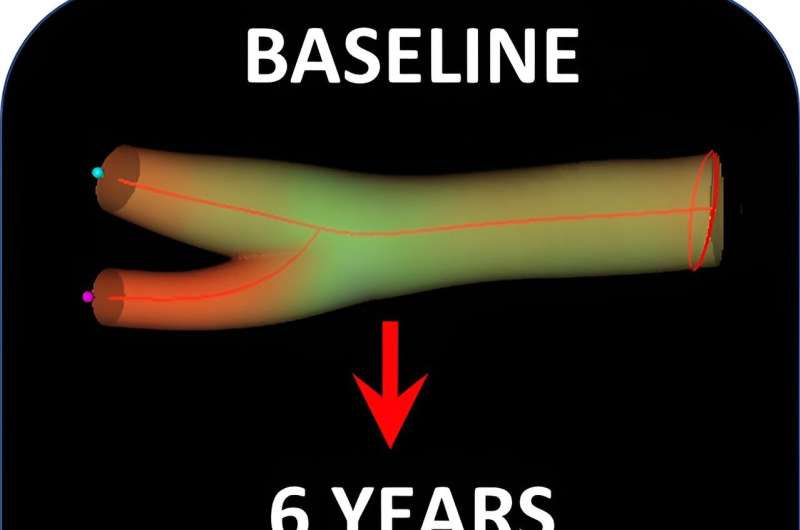This article has been reviewed according to Science X's editorial process and policies. Editors have highlighted the following attributes while ensuring the content's credibility:
fact-checked
peer-reviewed publication
proofread
Younger people are more vulnerable to the damaging effects of high blood cholesterol and hypertension, study shows

Young people may be more susceptible to the effects of the risk factors for developing atherosclerosis. According to a study carried out at the Centro Nacional de Investigaciones Cardiovasculares (CNIC), younger people are especially vulnerable to the damaging effects of elevated blood cholesterol and hypertension, two of the major modifiable cardiovascular risk factors.
These findings, published in the Journal of the American College of Cardiology, underline the need to implement aggressive control of cardiovascular risk factors at younger ages, requiring a change in primary prevention strategies to include "surveillance of subclinical atherosclerosis and early cardiovascular risk factor control."
The study was co-led by Dr. Valentín Fuster, CNIC General Director and Physician-in-Chief at Mount Sinai Medical Center in New York, and Dr. Borja Ibáñez, CNIC Scientific Director, a cardiologist at Hospital Universitario Fundación Jiménez Díaz, and a member of the CIBERCV cardiovascular research network in Spain.
Subclinical atherosclerosis often progresses in middle-aged individuals, especially if LDL-cholesterol levels and blood pressure are even mildly or moderately elevated. Medical professionals and the general public need to be aware that atherosclerosis progression can be stopped if risk factors are managed aggressively from an early age.
"Screening for subclinical atherosclerosis from an early age together with aggressive risk-factor control could help to reduce the global burden of cardiovascular disease," said Dr. Fuster.
Dr. Ibáñez explained that "in this study, we show that moderate increases in blood pressure and cholesterol have a much more pronounced impact on atherosclerosis progression in younger people."

Very few studies have investigated the progression of silent atherosclerosis in people who are completely free of symptoms, whether they are young or in apparently healthy middle age, and how this disease progresses throughout life.
The PESA-CNIC-Santander study (Progression of Early Subclinical Atherosclerosis) was launched in 2009 and is a close collaboration between the CNIC and Santander Bank.
More than 4,000 apparently healthy middle-aged Santander Bank employees in Madrid volunteered to undergo an exhaustive, noninvasive analysis of the carotid, femoral, and coronary arteries and the aorta. Participants also provided blood samples for advanced genomic, proteomic, and metabolomic analysis.
"The PESA study has already made important contributions to our understanding of cardiovascular disease and is considered the most advanced study of its kind in the field," said Dr. Fuster.
The current findings have important implications for cardiovascular prevention and personalized medicine. The study shows that the control of risk factors (principally elevated cholesterol and hypertension) should begin early in life, when the arteries are more vulnerable to the effects of these risk factors.
Dr. Borja Ibáñez said, "These results point the way to personalized approaches that use imaging technology to monitor the presence and progression of silent atherosclerosis and guide the intensity of risk-factor control."
Cardiologist Guiomar Mendieta, the first author of the study, added that "the other key finding of this study is that atherosclerosis, previously believed to be irreversible, can disappear if risk factors are controlled from an early stage."
"These findings are the outcome of the exhaustive collection of imaging and biochemical data over six years, combined with an innovative statistical analysis," explained Dr. Mendieta, who joined the CNIC through the CARDIOJOVEN SEC-CNIC training program, a joint initiative of the CNIC and the Spanish Society of Cardiology.
More information: Determinants of Progression and Regression of Subclinical Atherosclerosis over Six years, Journal of the American College of Cardiology (2023).




















